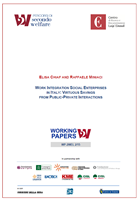- Ricerche e Progetti
- Biblioteca della Libertà
- Pubblicazioni e Working Paper
- Articoli e media
- Eventi e notizie
Percorsi di Secondo Welfare
2015
Work Integration Social Enterprises in Italy: Virtuous Savings from Public-Private Interactions
WP 2WEL 2/2015
- Autore/Author
- Elisa Chiaf, Raffaele Miniaci
- Articolo completo/Full text
- 2W_WP2-2015_Chiaf_Miniaci.pdf
Abstract
The aim of the paper is twofold: to describe the interactions between public and private organizations involved in the implementation of active inclusion policies in Italy, and to evaluate the savings for the public budget originated by activities of the Work Integration Social Enterprises (WISE).
We illustrate the features of the Italian active inclusion policies in terms of target population, cash benefits and economic incentives aimed at supporting the marginal labour force. These policies require coordinated actions by local governments, public health agencies and the no-profit organizations, typically social cooperatives, which directly deal with the vulnerable individuals. We provide a discussion of the legal framework, the alternative governance arrangements for the policy implementation and how these affect the behaviour of the institutional actors involved.
Within this framework we take a mere accounting approach and empirically investigate whether and to what extent the choice made by the Italian government of subsidising jobs for vulnerable individuals is generating savings for the public budgets. We consider a sample of 30 WISEs, employing about 1,200 disadvantaged workers during the years 2010-2012, for each subsidized position we carefully assess the economic value created by the job and the related tax revenue, we contrast them with the actual cost of the subsidies and the (counterfactual) cost of public assistance the worker would be entitled should s/he not been employed.
We use a multivariate analysis to determine the cost effectiveness of the alternative types of job contract adopted and study heterogeneity of the outcomes as function of the type of occupation and the disadvantage and occupation and gender of the beneficiaries.
Our preliminary results document that net contribution to the public budget of the subsidized jobs policy is positive and that supporting the activity of no-profit WISEs is a cost effective strategy.







